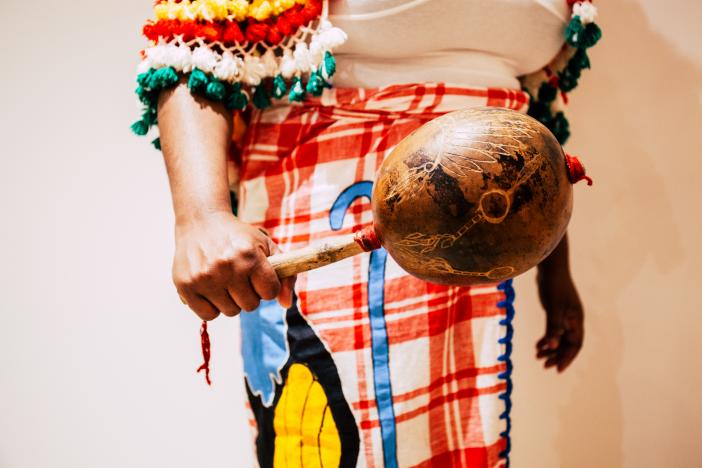The maraca
The maraca is a musical instrument made from calabash. It plays an important role among the various instruments used for traditional kawina, kauna and winti music in Afro-Surinamese culture. Among the native people, the maraca is considered to be a holy instrument of the ‘piaiman’. The piaiman uses the maraca to summon the spirits of ancestors during healing rituals, and to make contact with the ‘Schepper’ (Creator), Tamushi, for counseling and guidance. The natives have special maraca songs accompanied by dance, that are performed during special spiritual rituals.
There is a remarkable story behind my connection with the maraca. I inherited my maraca from the now only piaiman from Langamankondre in Galibi in Suriname. I call him Tushi, which means grandfather. I met him during a project about recording oral stories from piaimans and their gift to communicate with animals, especially birds. He told me about the rituals that a piaiman has to undergo, the specific birds that the piaiman communicates with, and the songs performed by the piaiman. He taught me to play the maraca.
When it was time for me to go back home (I was already living in the UK by then), he asked me to walk by his house before leaving. It had to be dark before I could come, he told me. Three days before I left, I visited him at his house at 8 o’clock in the evening. He was staying with his daughter and son-in-law close to the fifth driveway in the Wanica district. That night was magical. There was a cool breeze. We sat on the balcony, eating atjupo, a very spicy native soup made from fresh fish and the juice of the bitter cassava. After some time, around 10 o’clock, he spoke to me. He said that I ought to have a native name, and so he gave me one. It is a name I cherish very much and I do not give it away without good reason. Then he took me inside, to the living room. He put me on a chair and lit a cigar. It was not a regular cigar you could buy in the store. It was a cigar called oelemarie, which is smoked during special, ritual occasions. The purpose of the oelemarie was to ‘smoke’ me, or in other words, to envelop me in the holy smoke of the cigar. The tree bark with which the cigar is rolled, comes from a holy tree which is believed to house one of the mightiest native entities. This is the oelemarie tree. You will not find these in Paramaribo, as it is a tree that grows deep in the woods. And while he systematically embraced me with smoke, I followed his instructions to slowly breathe in the subtle yet prickling smell of the oelemarie. While smoking and exhaling, he first stood behind me, then next to me, and finally in front of me. He mumbled his prayers over me. It felt good. On the day of my departure, he sent me the maraca with which he did many of his ritual blessings. As a protection, he said. Since then, the maraca has been sitting on my native jug as a second safekeeper of the good and protector against evil in my house.
